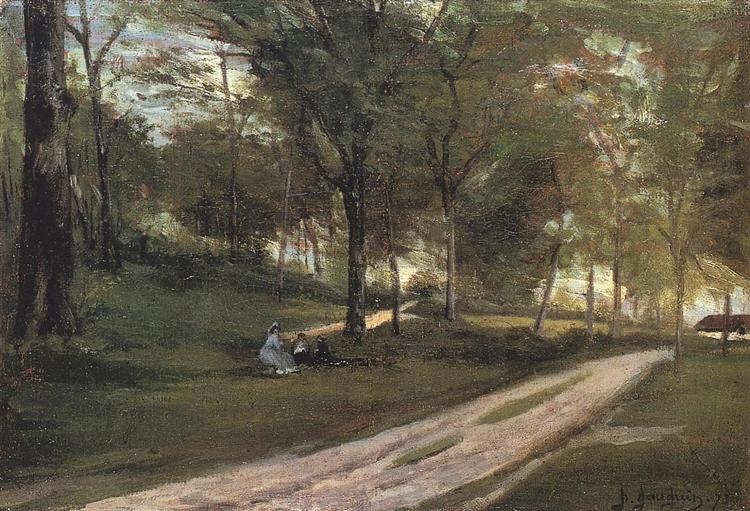Description
Paul Gauguin’s “In the Woods of Saint Cloud II,” created in 1873, is not only a testament to the artist’s budding talent, but also a fresco of the inextricable link between man and nature. Set early in his career, this painting reflects Gauguin’s process as he explores his personal style, in which the Impressionist tradition begins to give way to a more symbolic approach.
The composition of the work is uniquely balanced. In the foreground, a dense forest of trees can be seen, displaying different shades and shapes. This eclectic botanical display is typical of the works of the period, which sought a deep relationship with the natural environment. The vertical trees, robust and almost anthropomorphic in their presence, avoid the sensation of a static landscape. In this piece, there is a fusion between the sky and the vegetation; the green tones are intertwined with blues in a dialogue that evokes the calm and serenity of a forest in the middle of nature.
The use of color in “In the Woods of Saint Cloud II” is emblematic of Gauguin’s experimental approach. Vibrant hues and bold contrasts between greens and blues bring the scene to life, while shadows, hinted at in some areas, suggest filtered light that intensifies the dreamlike atmosphere of the piece. The choice of an unconventional palette and the almost decorative treatment of color are foreshadowing of the future post-impressionist style that Gauguin would adopt in his most renowned works.
As for the characters, the painting presents an intriguing yet subtle depiction of human figures, which is characteristic of this stage in Gauguin’s career. On the right-hand side, the silhouettes of two women can be discerned. These figures seem to be in communion with their surroundings, almost merging with the nature around them. Their position and posture, intimate and relaxed, suggest a deep bond not only between them, but also with the landscape. This anticipates Gauguin’s future interest in portraying life in Polynesia, where the relationship between humans and the natural context becomes an essential theme.
“In the Woods of Saint Cloud II” can be seen as a precursor to what was to come later. The work shows his emotional and technical evolution, marked by the search for aesthetic novelty. Through the exploration of nature, Gauguin moves away from the conventions of his time, investigating beyond visible reality and delving into the symbolic. This painting is a bridge between Impressionism, from which Gauguin departs, and the innovations that he and his contemporaries would later explore.
The forest, in the work, is not merely a backdrop, but an active component of the visual narrative. The arboreal forms impose a romantic commitment that invites the viewer to contemplate not only what is shown, but also what is hinted at. Thus, “In the Woods of Saint Cloud II” represents not only a moment in Gauguin’s life, but also a broader reflection on the perception of the natural environment in the work of art, prefiguring his exploration of spirituality, symbolism, and the exotic in his later works. In short, this work is a testament to Gauguin’s artistic journey and an invitation to introspection in the embrace of nature.
KUADROS ©, a famous painting on your wall.
Hand-made oil painting reproductions, with the quality of professional artists and the distinctive seal of KUADROS ©.
Painting reproduction service with satisfaction guarantee. If you are not completely satisfied with the replica of your painting, we will refund 100% of your money.

